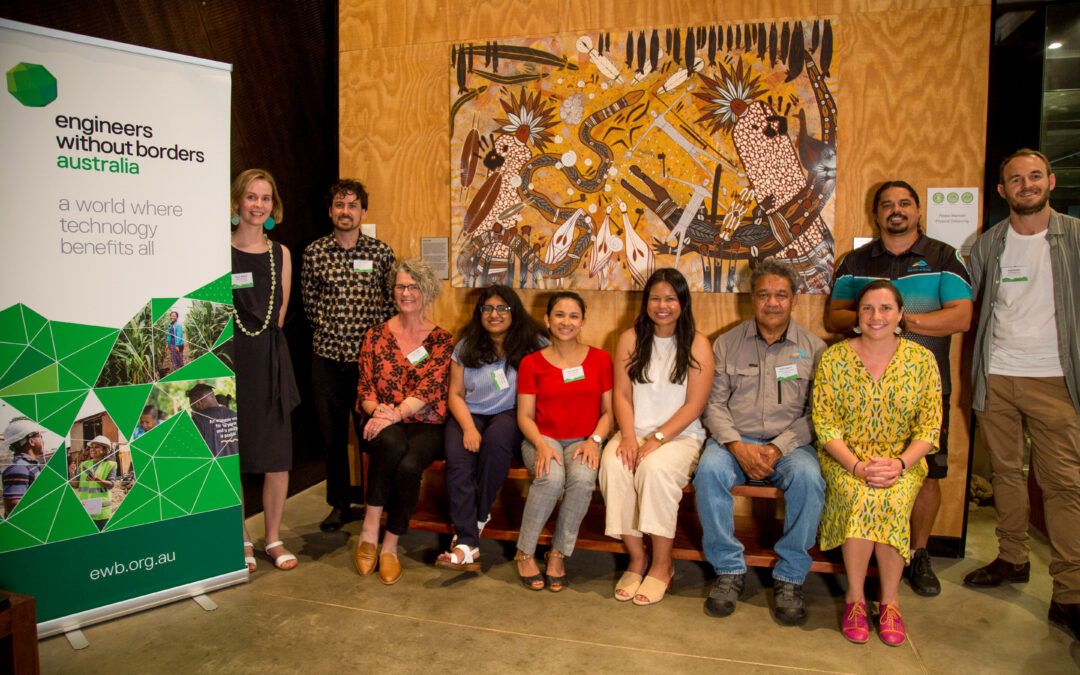Pictured: EWB Australia staff and Dawul Wuru Aboriginal Corporation staff at the 2022 EWB Challenge Showcase in Cairns.
Public bins built from recycled plastic bricks; a citizen’s wildlife reporting app; and a fish trap inspired by the Rainbow Serpent dreamtime story. These were just some of the many innovative solutions presented by first year engineering university students at the 2022 EWB Challenge Showcase held earlier this month.
Hosted by event sponsors TNQ Drought Hub and The Cairns Institute at James Cook University’s Nguma-bada campus, the 15th EWB Challenge Showcase heralded the return to in-person showcases since the start of the pandemic. Students, academics, judges, and EWB staff from around Australia were eager to travel to Yirrganydji Country in far north Queensland, which was the site of the project brief for this year’s EWB Challenge. It was the first time in EWB Challenge history that students had an opportunity to spend time with the community partner at the location that their design responses sought to support – creating an especially enriching experience for these talented finalists.
The Showcase
The two-day Showcase kicked off with a cultural tour facilitated by the 2022 EWB Challenge community partner, Dawul Wuru Aboriginal Corporation (Dawul Wuru). Led by Senior Ranger, Brian Singleton, and Project Manager, Gavin Singleton, showcase attendees explored Jakal (Palm Cove), Clifton Beach and the Jack Barnes Bicentennial Mangrove Boardwalk. Brian and Gavin enthusiastically explained their cultural practices and the line of work for their rangers, whilst also patiently answering our many questions (including crocodile-related enquiries!). The cultural tour was a wonderful opportunity for students to consolidate their learnings from the semester.
“It was an enlightening experience, walking in the country and listening to the stories of the community we designed our projects for. This isn’t something we could get in our urban city life or classrooms,” said one of the students from Swinburne University.
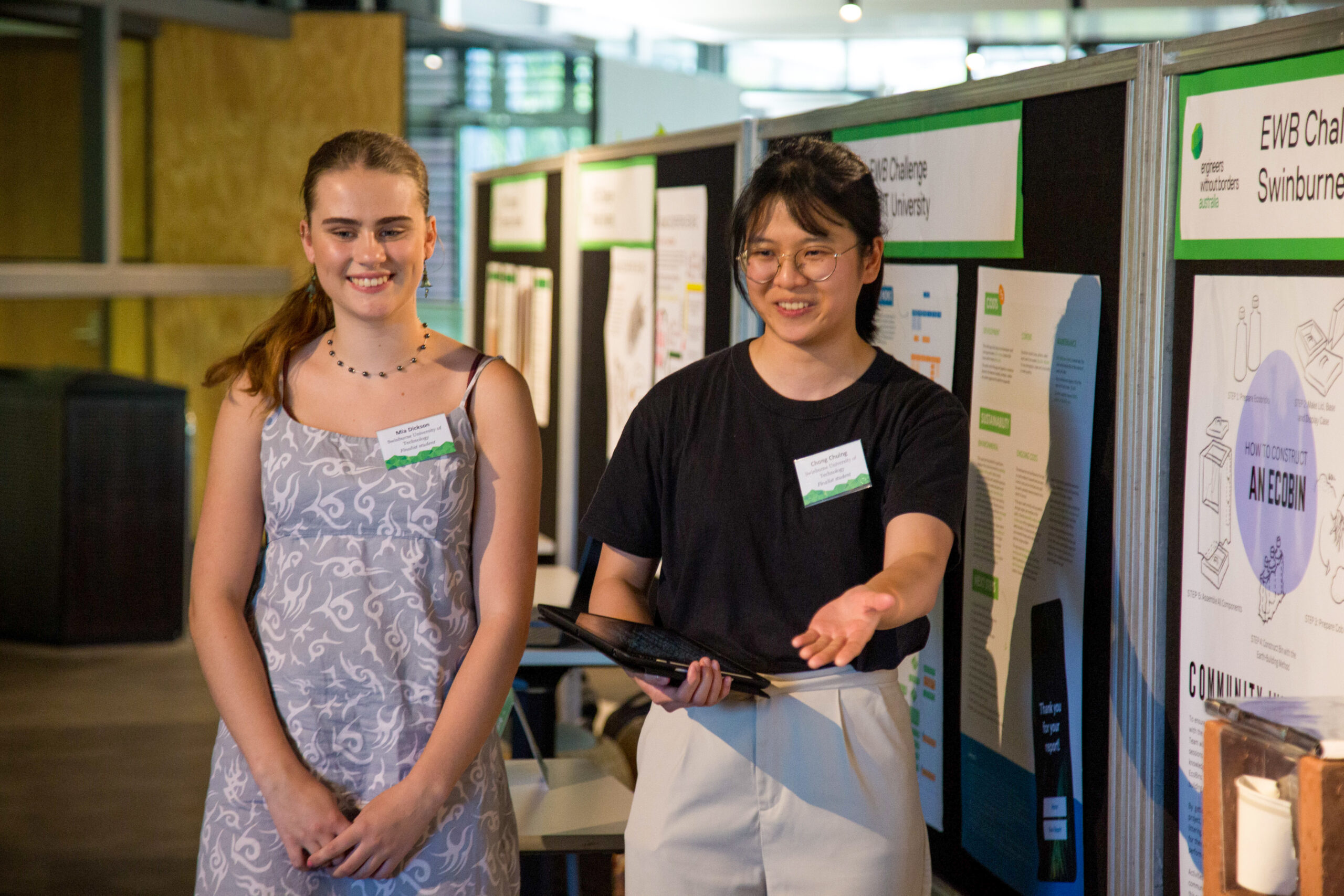
Swinburne University students presenting their pitch to the judges at the EWB Challenge Showcase.
The second day of the Showcase saw 35 students from 13 universities pitch their projects to the judges, anxiously wait for the results, claim their prizes and head off to a local venue to celebrate, network and wind down after a big day.
“As an all-female group, we are especially honoured to have this opportunity to represent women in engineering, women in STEM, as well as showcasing that science and engineering can be an option for all women in different stages of life; we range in age from 18 to 36, school leavers to a mum with two kids and a full-time job making a career change.” – Naomi Moore, Griffith University student.
Award Winners
Students who participated in the 2022 EWB Challenge developed design proposals addressing a variety of themes such as information and communication technology, energy, caring for sea country, waste management and water management. Some design proposals also looked at the development of a Cultural Hub on Country, a long-term aspiration of Dawul Wuru.
The judges were impressed with the high calibre of student projects, and will be reviewing the pitches and presentations in the coming weeks to explore what’s next.
A big congratulations to our award winners for 2022!
- Showcase Pitch Award: Griffith University – Catching Kunyarra – A quiet approach to crocodile monitoring
- Community Partner Award: University of South Australia – Modular Community Hub
- People’s Choice Award: Charles Darwin University – Bamboo tube pot for mangrove revegetation
- People’s Choice Award: RMIT University – Citizen’s wildlife reporting app
- Best Stall Award: Curtin University – Redesigned boat engine to reduce vibrations caused by crocodile monitoring boats
- Industry Reviewer Award: University of Western Sydney – Nursery for cultivating bush tucker
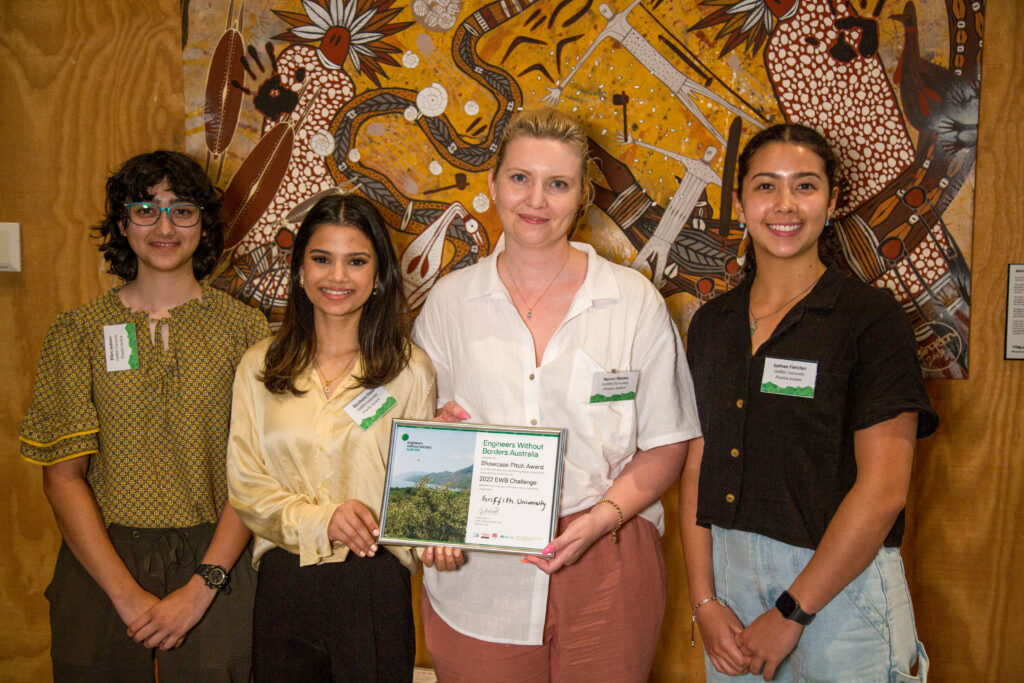
Showcase Pitch Award: Griffith University – Catching Kunyarra – A quiet approach to crocodile monitoring
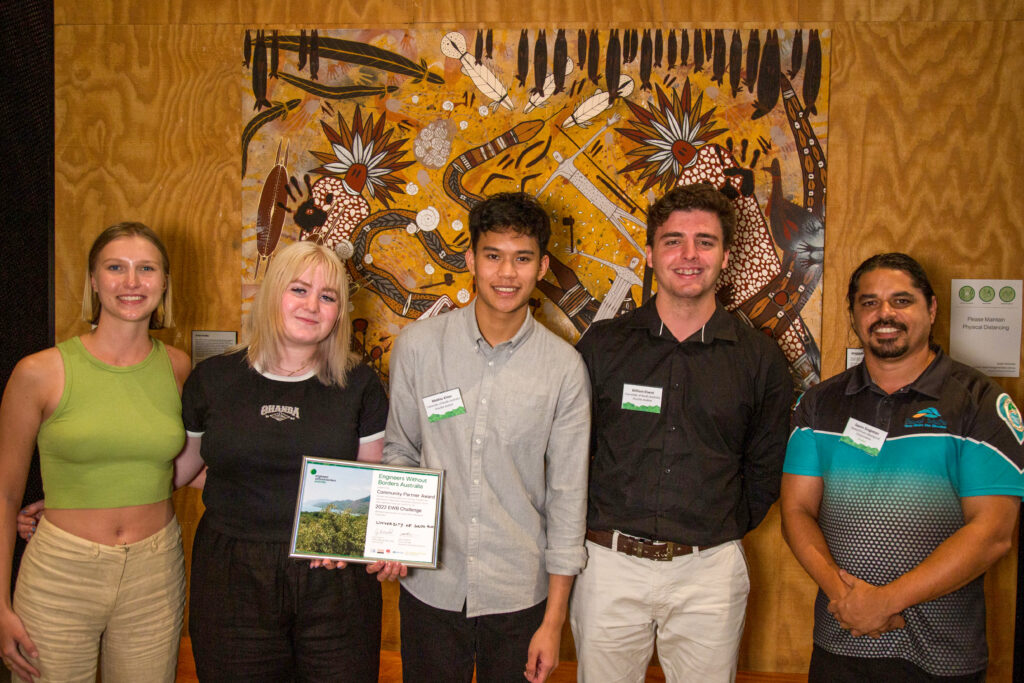
Community Partner Award: University of South Australia – Modular Community Hub
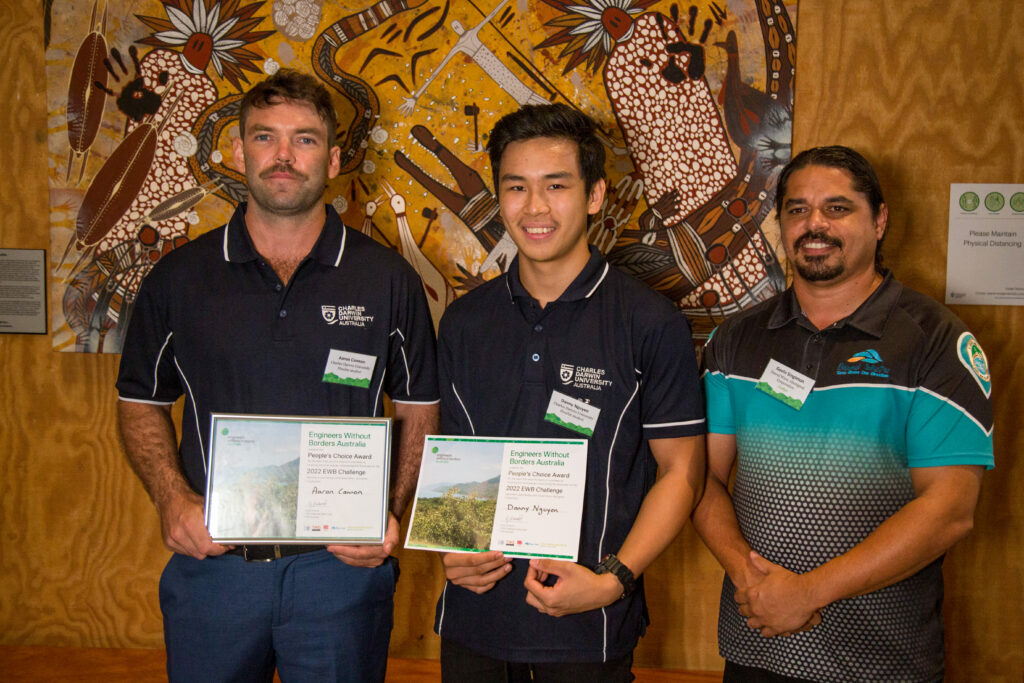
People’s Choice Award: Charles Darwin University – Bamboo tube pot for mangrove revegetation
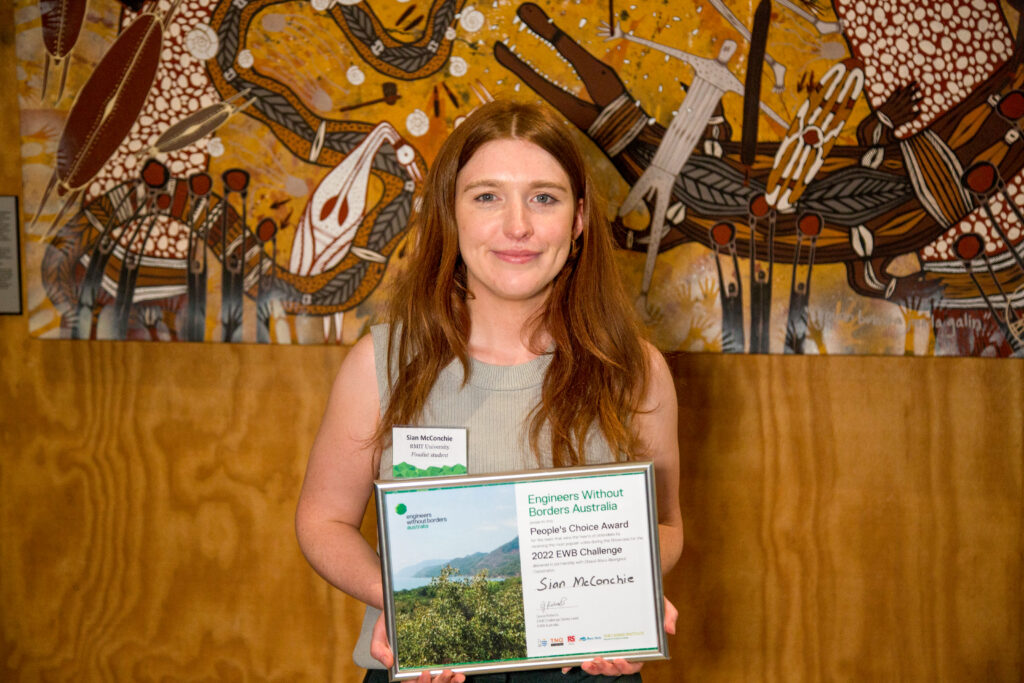
People’s Choice Award:RMIT University – Citizen’s wildlife reporting app
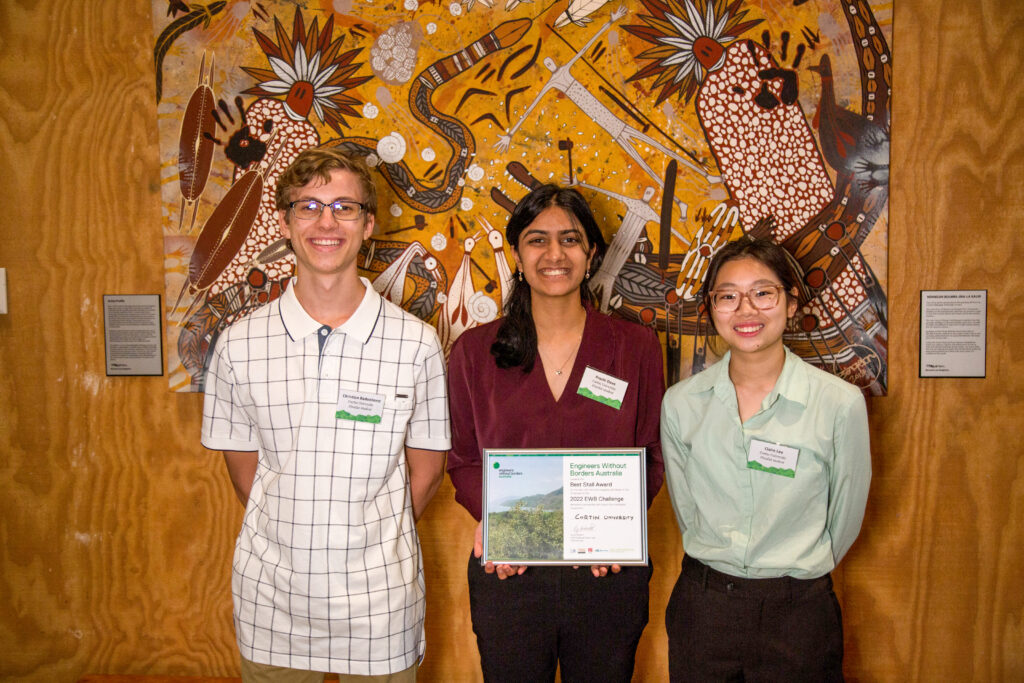
Best Stall Award: Curtin University – Redesigned boat engine to reduce vibrations caused by crocodile monitoring boats
15 Years of the Challenge
As we celebrate 15 years of the EWB Challenge, we’re excited to report this year’s program has seen the highest reach since its inception in 2008. Over 11,800 students across 23 universities in Australia and New Zealand explored the Yirrganydji context as part of their curriculum. High school students in Melbourne have also innovated solutions under this First Nations context in the most recent Innovation Challenge run by The University of Melbourne EWB Chapter in November this year.
EWB Australia would like to acknowledge the Yirrganydji traditional owners and thank Dawul Wuru, their staff and partners who have shared so much with us to inform the 2022 EWB Challenge brief. EWB Australia also like to thank RS Group, who sponsored the 2022 EWB Challenge, and The Drought Hub and Cairns Institute for hosting the 2022 EWB Challenge Showcase.
The EWB Challenge is delivered as part of the EWB Challenge Series, EWB’s real-world curriculum-integrated university education programs. Learn more about the EWB Challenge here.
Explore more about our event sponsor, TNQ Drought Hub, and their programs here.
This article is produced as part of our RAP commitment to communicating our learnings and sharing case studies from implementing our RAP.


